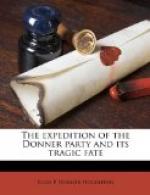I stooped low and peered into the dark depths. Then I called to my cousins to come to me, because I was afraid to go where they were. I had not seen them since the day we encamped. At that time they were chubby and playful, carrying water from the creek to their tent in small tin pails. Now, they were so changed in looks that I scarcely knew them, and they stared at me as at a stranger. So I was glad when my mother came up and took me back to our own tent, which seemed less dreary because I knew the things that were in it, and the faces about me.
Father’s hand became worse. The swelling and inflammation extending up the arm to the shoulder produced suffering which he could not conceal. Each day that we had a fire, I watched mother sitting by his side, with a basin of warm water upon her lap, laving the wounded and inflamed parts very tenderly, with a strip of frayed linen wrapped around a little stick. I remember well the look of comfort that swept over his worn features as she laid the soothed arm back into place.
By the middle of January the snow measured twelve and fourteen feet in depth. Nothing could be seen of our abode except the coils of smoke that found their way up through the opening. There was a dearth of water. Prosser Creek was frozen over and covered with snow. Icicles hung from the branches of every tree. The stock of pine cones that had been gathered for lights was almost consumed. Wood was so scarce that we could not have fire enough to cook our strips of rawhide, and Georgia heard mother say that we children had not had a dry garment on in more than a week, and that she did not know what to do about it. Then like a smile from God, came another sunny day which not only warmed and dried us thoroughly but furnished a supply of water from dripping snowbanks.
The twenty-first was also bright, and John Baptiste went on snowshoes with messages to the lake camp. He found its inmates in a more pitiable condition than we were. Only one death had occurred there since our last communication, but he saw several of the starving who could not survive many days.
The number to consume the slender stock of food had been lessened, however, on the sixteenth of December, some six weeks previously, by the departure of William Eddy, Patrick Dolan, Lemuel Murphy, William Foster, Mrs. Sarah Foster, Jay Fosdick, Mrs. Sarah Fosdick, Mrs. William McCutchen, Mrs. Harriet Pike, Miss Mary Graves, Franklin Graves, Sr., C.T. Stanton, Antonio, Lewis, and Salvador.
This party, which called itself “The Forlorn Hope,” had a most memorable experience, as will be shown later. In some instances husband had parted from wife, and father from children. Three young mothers had left their babes in the arms of grandmothers. It was a dire resort, a last desperate attempt, in face of death, to save those dependent upon them.
Staff in hand, they had set forth on snowshoes, each carrying a pack containing little save a quilt and light rations for six days’ journeying. One had a rifle, ammunition, flint, and hatchet for camp use. William Murphy and Charles Burger, who had originally been of the number, gave out before the close of the first day, and crept back to camp. The others continued under the leadership of the intrepid Eddy and brave Stanton.




